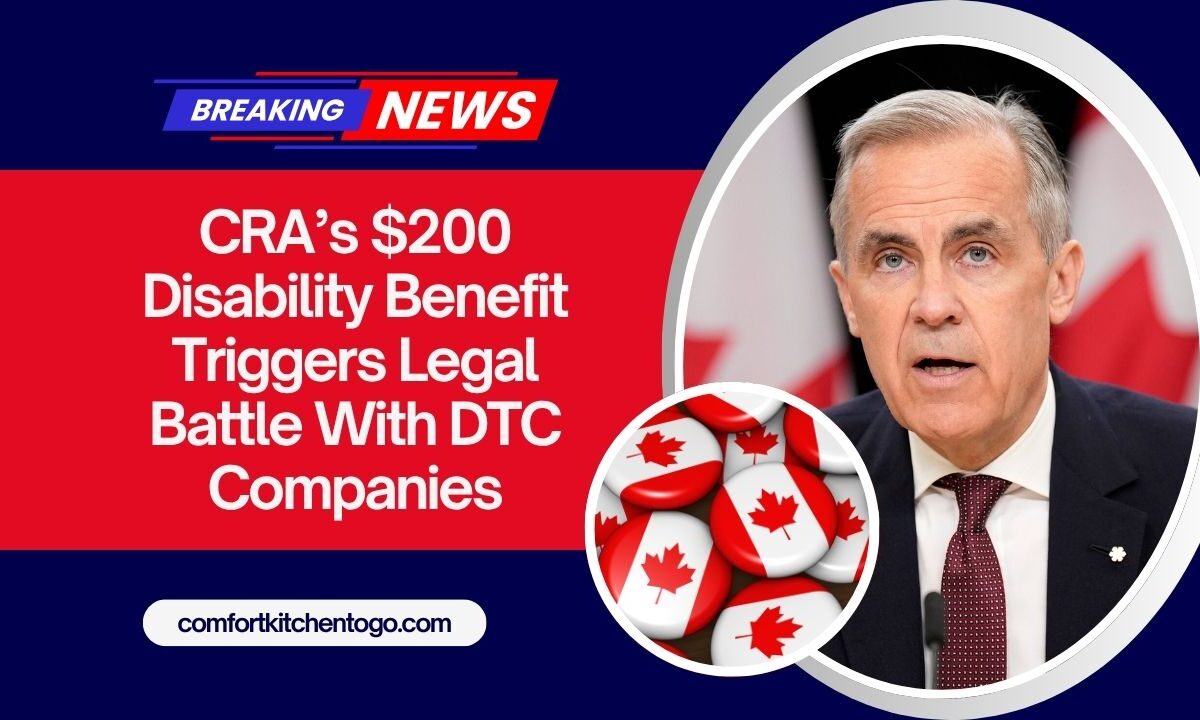As the Canadian government prepares to roll out the new $200 monthly Canada Disability Benefit in July 2025, an unexpected legal storm is brewing.
At the heart of it is the Disability Tax Credit (DTC)—a required gateway to access the benefit—and the high fees charged by third-party DTC companies, which has triggered a legal battle with the Canada Revenue Agency (CRA).
Canadians with disabilities and their families are voicing frustration over steep service charges—often in the thousands of dollars—simply to gain access to a benefit designed to reduce poverty.
As demand surges for the DTC, so too does concern over the equity and accessibility of the system, especially for low-income households.
Families Paying Thousands for DTC Help
Kathy Meyers from Port Coquitlam, B.C., was shocked to receive a $7,600 bill from True North Disability Services after seeking help with DTC applications for herself and her son. Like many others, Meyers felt cornered—dealing with serious illness and unaware of free support options.
These high charges are typically contingency-based fees ranging between 15% and 40% of the total refund amount.
Critics say this pricing model disproportionately affects vulnerable Canadians, while advocates for the companies argue that the fees cover essential administrative and healthcare coordination services.
Why the DTC Is Now a Legal Battleground
With the new Canada Disability Benefit launching, the CRA expects DTC applications to triple over the next five years. However, the process remains complex and paperwork-heavy, often involving 16-page forms and repeated interaction with doctors.
To protect applicants, the federal government attempted to cap DTC service fees at $100. But in 2021, True North and co-founder Shane Nercessian challenged the regulation in BC Supreme Court and won an injunction to block the cap.
Nercessian argued that such a limit would make the business model financially unsustainable. A full trial is scheduled for July 2026.
DTC Fee Controversy Overview
| Aspect | Details |
|---|---|
| New Benefit | $200/month Canada Disability Benefit (starts July 2025) |
| DTC Requirement | Mandatory to access the new benefit |
| Service Fee Range | 15% – 40% of refund amount |
| Notable Case | Kathy Meyers charged $7,600 by True North |
| Legal Development | 2021 injunction blocks CRA’s proposed $100 cap |
| Trial Date | July 2026 |
Mixed Reactions from DTC Users
While some clients say they were satisfied with the results, others regret the financial toll. Kathy Johnson from Blue River paid $1,900 out of a $9,000 refund and still recommends her DTC firm. Meanwhile, Leanne King spent $3,850 with True North and called the process “a bit predatory.”
There’s also added concern over medical fees, with doctors often charging $150 or more per form. These extra costs—combined with high contingency fees—can devastate families already living with disability-related expenses.
CRA and Medical Community Push for Reform
To make the DTC more accessible, the CRA digitized the application process in 2023. However, calls to allow doctor’s notes or electronic medical records as substitutes have met resistance due to legislative limitations.
Doctors and healthcare professionals argue the forms are too long and emotionally taxing. The Canadian Medical Association has joined calls for shorter, digitally integrated forms that reduce doctor workload and improve patient access.
Government Investment in Free DTC Support
To address these issues, the government has pledged substantial funding:
- $23.5 million allocated to six non-profits to help Canadians apply for the DTC at no cost
- $243 million earmarked to cover medical professionals’ form-completion fees
These investments aim to reduce reliance on expensive third-party services and streamline access to essential benefits.
Systemic Reform Demanded by Experts
Former MP Carla Qualtrough, who led work on the Canada Disability Benefit, called the current system “heartbreaking.” She emphasized that a benefit meant to fight poverty should not require applicants to pay thousands upfront just to qualify.
Qualtrough and other experts advocate for a centralized, inclusive system that removes financial and administrative hurdles for disabled Canadians. As she noted, “We’re asking tax analysts to gatekeep access to social benefits—and that just doesn’t make sense.”
The controversy surrounding high fees for Disability Tax Credit services highlights the urgent need for reform as the $200 monthly Canada Disability Benefit prepares to launch.
While some Canadians rely on third-party firms for help, others are paying a steep price for access to what is supposed to be a poverty-fighting benefit.
With the CRA digitizing the application process and millions in government funding allocated to free support services, steps are being taken in the right direction.
However, as legal battles continue and demand surges, only a streamlined, transparent, and equitable system will ensure that no disabled Canadian is left behind due to bureaucracy or financial exploitation.
FAQs
Do I need to go through a third-party company to apply for the DTC?
No. There are free support services available through government-funded non-profits. You can also apply directly via the CRA website.
Is the $200 Canada Disability Benefit automatic?
No. You must first qualify for the DTC, which is a prerequisite for the new benefit launching in July 2025.
Will the CRA cap third-party fees for DTC applications?
Not yet. While the government tried to impose a $100 fee cap, it is currently blocked by a court injunction pending a trial in 2026.

